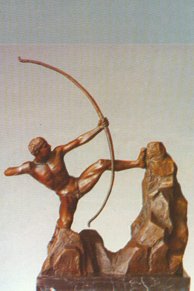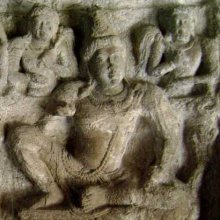Amukta, Āmukta: 12 definitions
Introduction:
Amukta means something in Hinduism, Sanskrit. If you want to know the exact meaning, history, etymology or English translation of this term then check out the descriptions on this page. Add your comment or reference to a book if you want to contribute to this summary article.
Images (photo gallery)
In Hinduism
Arthashastra (politics and welfare)
Source: Exotic India: Nitiprakasika of Vaisampayana (A Critical Edition)1) Amukta (अमुक्त) are the weapons not to be released, but to be held in the hand while in use, such as the sword. (see Vasiṣṭha-dhanurveda)
2) Amukta (अमुक्त) is the war where weapons like sword, etc. that are not released from the hand are used. (see Agnipurāṇa 249.2)

Arthashastra (अर्थशास्त्र, arthaśāstra) literature concerns itself with the teachings (shastra) of economic prosperity (artha) statecraft, politics and military tactics. The term arthashastra refers to both the name of these scientific teachings, as well as the name of a Sanskrit work included in such literature. This book was written (3rd century BCE) by by Kautilya, who flourished in the 4th century BCE.
Dhanurveda (science of warfare)
Source: Shodhganga: Rajadharma in the Mahabharata (dhanurveda)Amukta (अमुक्त) refers to the second class of weapons, according to the second chapter of the Nītiprakāśikā:—Amuktas are those which are not thrown, e.g. sword, mace etc. there are twenty varities of arms in amukta class of the Dhanurveda.

Dhanurveda (धनुर्वेद) refers to the “knowledge of warfare” and, as an upaveda, is associated with the Ṛgveda. It contains instructions on warfare, archery and ancient Indian martial arts, dating back to the 2nd-3rd millennium BCE.
Languages of India and abroad
Sanskrit dictionary
Source: DDSA: The practical Sanskrit-English dictionaryAmukta (अमुक्त).—a.
1) Not loosened, not let go.
2) Not liberated from recurring birth and death, not having got final beatitude.
-ktam A weapon (a knife, sword &c.) that is always grasped and not thrown. चतुर्विधमायुधम् । मुक्तममुक्तं मुक्तामुक्तं यन्त्रमुक्तं चेति (caturvidhamāyudham | muktamamuktaṃ muktāmuktaṃ yantramuktaṃ ceti) Dhanur. V.4.
--- OR ---
Āmukta (आमुक्त).—p. p.
1) Loosened, let go, liberated.
2) Put on, worn &c. आमुक्तमुक्तालतमस्य वक्षः (āmuktamuktālatamasya vakṣaḥ) | Śi. see above.
3) Discharged, cast, shot off.
-ktam Armour.
Source: Cologne Digital Sanskrit Dictionaries: Edgerton Buddhist Hybrid Sanskrit DictionaryĀmukta (आमुक्त).—[ (?) , ppp., f. °tā, according to Divyāvadāna Index jewel, in Divyāvadāna 2.28 (ratnapratyuptikayā) karṇikayā āmuktayālaṃ- kṛtaḥ; 3.7 koṭimūlyayā ratnapratyuptikayā āmuktayā jātaḥ; and see āmuktaka, °ikā. I doubt this meaning; in 2.28 it seems a normal ppp. = Sanskrit āmukta, °ā: adorned with a jewel-set earring fastened on him (compare also Divyāvadāna 614.17 āmuktamālyābharaṇā, with garlands and ornaments fastened on); this is a regular meaning of āmuñcati.In 3.7, to be sure, no noun is expressed; the same karṇikā of 2.28 is however clearly meant; possibly here ratna-pratyuptikayā may be understood as a subst., with specifying ka (§ 22.39): with a jewel-studded thing fastened on.]
Source: Cologne Digital Sanskrit Dictionaries: Shabda-Sagara Sanskrit-English DictionaryAmukta (अमुक्त).—mfn.
(-ktaḥ-ktā-ktaṃ) 1. Not loosed, not let go. 2. Not liberated from birth and death. n.
(-ktaṃ) A weapon that is always grasped to be used, as a knife, &c. See muktāmukta, yantrāmukta, &c. E. a neg. and mukta released.
--- OR ---
Āmukta (आमुक्त).—mfn.
(-ktaḥ-ktā-ktaṃ) 1. Loosed, let go. 2. Discharged, cast, shot. 3. Put on as clothes or armour. 4. Dressed, accoutred. E. āṅ before muca to release, unbind, &c. kta aff.
Source: Cologne Digital Sanskrit Dictionaries: Cappeller Sanskrit-English DictionaryAmukta (अमुक्त).—[adjective] not loosed or liberated, not given up.
--- OR ---
Āmukta (आमुक्त).—[adjective] put on or off, clothed in or with ([accusative] or —°).
Source: Cologne Digital Sanskrit Dictionaries: Monier-Williams Sanskrit-English Dictionary1) Amukta (अमुक्त):—[=a-mukta] mfn. not loosed, not let go, not liberated from birth and death, not liberated from Rāhu, still eclipsed, [Viṣṇu-smṛti, viṣṇu-sūtra, vaiṣṇava-dharma-śāstra]
2) [v.s. ...] n. a weapon that is always grasped and not thrown (as a knife, a sword, etc.)
3) Āmukta (आमुक्त):—[=ā-mukta] [from ā-muc] mfn. put on (as a garment etc.), dressed, accoutred, [Mahābhārata; Rājataraṅgiṇī; Śiśupāla-vadha] etc.
4) [v.s. ...] put off, left off, undressed
5) [v.s. ...] let go, discharged, cast, shot off
6) [v.s. ...] n. armour, [cf. Lexicographers, esp. such as amarasiṃha, halāyudha, hemacandra, etc.]
7) Āmuktā (आमुक्ता):—[=ā-muktā] [from ā-mukta > ā-muc] f. a jewel, [Divyāvadāna]
Source: Cologne Digital Sanskrit Dictionaries: Yates Sanskrit-English Dictionary1) Amukta (अमुक्त):—[a-mukta] (ktaṃ) n. A weapon; a knife. a. unloosed; bound.
2) Āmukta (आमुक्त):—[ā-mukta] (ktaḥ-ktā-ktaṃ) a. Clothed.
Source: DDSA: Paia-sadda-mahannavo; a comprehensive Prakrit Hindi dictionary (S)Amukta (अमुक्त) in the Sanskrit language is related to the Prakrit words: Amutta, Āmukka.
[Sanskrit to German]
Sanskrit, also spelled संस्कृतम् (saṃskṛtam), is an ancient language of India commonly seen as the grandmother of the Indo-European language family (even English!). Closely allied with Prakrit and Pali, Sanskrit is more exhaustive in both grammar and terms and has the most extensive collection of literature in the world, greatly surpassing its sister-languages Greek and Latin.
Kannada-English dictionary
Source: Alar: Kannada-English corpusAmukta (ಅಮುಕ್ತ):—
1) [adjective] not set free; subject to or secured by a bond; bound; bonded.
2) [adjective] not liberated from recurring birth and death; not having got final beatitude.
--- OR ---
Amukta (ಅಮುಕ್ತ):—[noun] a weapon, such as a sword, knife, dagger, etc. (that is held firmly while using unlike an arrow, spear etc. which is either shot or thrown).
--- OR ---
Āmukta (ಆಮುಕ್ತ):—
1) [adjective] loosened; freed from confinement or restraint; unfastened.
2) [adjective] worn; put on.
3) [adjective] discharged; cast, shot off.
--- OR ---
Āmukta (ಆಮುಕ್ತ):—
1) [noun] an armoured man.
2) [noun] a defensive dress; armour.
Kannada is a Dravidian language (as opposed to the Indo-European language family) mainly spoken in the southwestern region of India.
See also (Relevant definitions)
Starts with: Amuktabharana, Amuktabharanasaptamivratanirnaya, Amuktabharanavrata, Amuktahasta, Amuktahastata, Amuktaka, Amuktavishrambha.
Ends with (+42): Abdamukta, Akarnamukta, Akshayamukta, Anamukta, Apadamukta, Ardhamukta, Avamtaramukta, Avamukta, Bandhamukta, Bhavamukta, Bhedamukta, Bhrucapakrishtamukta, Dehamukta, Doshamukta, Duhkhamukta, Dukkhamukta, Gajamukta, Gajarajamukta, Gandivamukta, Gunavipramukta.
Full-text (+2): Amutta, Amuktahasta, Amukka, Amuktaka, Vimukta, Amuktavishrambha, Amuktahastata, Samuc, Pratyuptaka, Muktamukta, Amuci, Vranapatta, Muktahasta, Amuttam, Amukti, Amuc, Virupa, Muc, Khanga, Lajja.
Relevant text
Search found 20 books and stories containing Amukta, A-mukta, Ā-mukta, Ā-muktā, Āmukta, Āmuktā; (plurals include: Amuktas, muktas, muktās, Āmuktas, Āmuktās). You can also click to the full overview containing English textual excerpts. Below are direct links for the most relevant articles:
Sahitya-kaumudi by Baladeva Vidyabhushana (by Gaurapada Dāsa)
Text 4.16 < [Chapter 4 - First-rate Poetry]
Mahabharata (English) (by Kisari Mohan Ganguli)
Section CLXXXI < [Uluka Dutagamana Parva]
Nitiprakasika (Critical Analysis) (by S. Anusha)
Preface (Introduction to the Nītiprakāśikā)
Sarga I: Rājadharma-upadeśa (57 Verses) < [Chapter 2]
Weapons and War in Epics and Purāṇās < [Chapter 1]
Srila Gurudeva (The Supreme Treasure) (by Swami Bhaktivedanta Madhava Maharaja)
Avatāras as stated Śrī Madhvācārya < [Chapter 1.5 - Back to Home Village]
The Tamils and the Andhras < [July-September, 1928]
Reviews < [January 1958]
Master E. K.: A Phenomenon < [April – June, 1984]
Puranic encyclopaedia (by Vettam Mani)
